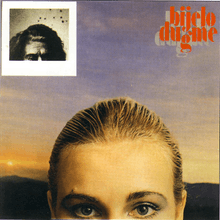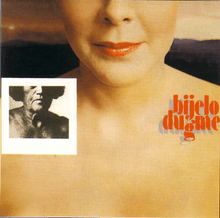Doživjeti stotu
| Doživjeti stotu | ||||
|---|---|---|---|---|
 | ||||
| Studio album by Bijelo Dugme | ||||
| Released | December 12, 1980 | |||
| Recorded |
Studio 4, Radio Belgrade October–November 1980 | |||
| Genre |
Rock New Wave Ska | |||
| Length | 32:19 | |||
| Label | Jugoton | |||
| Producer | Goran Bregović | |||
| Bijelo Dugme chronology | ||||
| ||||
| Second version of the cover | ||||
 |
||||
| Third version of the cover | ||||
 |
||||
Doživjeti stotu (trans. Live to Be 100) is the fifth studio album by Yugoslav rock band Bijelo Dugme, released in 1980.
The album marked the band's shift from their folk-influenced hard rock sound towards New Wave. It is the band's second and the last studio album to feature Zoran "Điđi" Jankelić on drums.
Doživjeti stotu was polled in 1998 as the 35th on the list of 100 greatest Yugoslav rock and pop albums in the book YU 100: najbolji albumi jugoslovenske rok i pop muzike (YU 100: The Best albums of Yugoslav pop and rock music).[1]
Background
At the end of 1970s and the beginning of 1980s, the Yugoslav rock scene saw the emergence of the great number of New Wave bands, closely associated to the Yugoslav punk rock scene. In December 1980, Bijelo Dugme released New Wave-influenced album Doživjeti stotu, with only "Pristao sam biću sve što hoće" and "Pjesma mom mlađem bratu" resembling Bijelo Dugme's old sound.[2] Doživjeti stotu was the first Bijelo Dugme album produced by the band's guitarist and leader Goran Bregović.[2] The songs "Ha ha ha" and "Tramvaj kreće (ili kako biti heroj u ova šugava vremena)" were the first Bijelo Dugme songs to feature political-related lyrics.[2]
In accordance with their shift towards New Wave, the band changed their hard rock style: the members cut their hair short, and the frontman Željko Bebek shaved his trademark mustache.[3]
Album cover
The provocative cover, which appeared in three different versions, was designed by Mirko Ilić, artist closely associated with the Yugoslav New Wave scene.[2]
Track listing
All songs written by Goran Bregović, except where noted.
| No. | Title | Lyrics | Music | Length | |
|---|---|---|---|---|---|
| 1. | "Doživjeti stotu" ("Live to Be 100") | D. Trifunović | G. Bregović | 3:12 | |
| 2. | "Lova" ("Money") | 2:49 | |||
| 3. | "Tramvaj kreće (ili Kako biti heroj u ova šugava vremena)" ("Streetcar Is Leaving (Or How to Be a Hero in These Lousy Times)") | 3:14 | |||
| 4. | "Hotel, motel" | 3:33 | |||
| 5. | "Pjesma mom mlađem bratu (iz Niša u proljeće '78)" ("A Song for My Little Brother (from Niš in Spring of '78)") | 4:14 | |||
| 6. | "Čudesno jutro u krevetu gospođe Petrović" ("A Faboulous Morning in the Bed of Mrs. Petrović") | 2:29 | |||
| 7. | "Mogla je biti prosta priča" ("It Could Have Been a Simple Story") | 2:47 | |||
| 8. | "Ha, ha, ha" | 3:10 | |||
| 9. | "Zažmiri i broj" ("Close Your Eyes and Count") | 3:45 | |||
| 10. | "Pristao sam biću sve što hoće" ("I Accepted, I'll Be Anything She Wants") | D. Trifunović | G. Bregović | 3:01 |
Personnel
- Goran Bregović - guitar, producer
- Željko Bebek - vocals
- Zoran Redžić - bass
- Điđi Jankelić - drums
- Vlado Pravdić - keyboard
Additional personnel
- Jelenko Milaković - percussion
- Jovan Maljoković - saxophone
- Paul Pignon - saxophone
- Predrag Kostić - trumpet
- Rade Ercegovac - engineer
- Mirko Ilić - design
- Željko Stojanović - photography
Reception and reactions
Immediately after the release, the song "Čudesno jutro u krevetu gospođe Petrović" received a radio ban on some radio and TV stations due to the lyric "sve u finu materinu".[3]
Due to the radically new sound, the album was met with a lot of skepticism. However, bandleader Bregović stated as the group prepared to start a tour:
| “ | It would've been foolish to make this record any different than it is since this is the only way I feel my music at the moment. When I look back, I think this is our first album with this much energy. We're hungry for music and I think our live shows will also be exceptional. The record is all tempo, it's got a lot of text and rhythm and I think the public will like it.[3] | ” |
Most of the critics praised the album.[3] In the album review published in Duga magazine, Petar Luković wrote:
| “ | What is especially impressive about Bijelo Dugme is their ability to constantly renew their audience, to recruit from the lines of younger listeners the very ones which are ready to except, through lyrics and visual image, Dugme as a representative of autonomous rock spirit.[3] | ” |
At the end of 1980, the reader's of Džuboks magazine polled Bijelo Dugme the Band of the Year, Željko Bebek the Singer of the Year, the band's keyboardist Vlado Pravdić the Keyboardist of the Year, Điđi Jankelić the Drummer of the Year, the band's bass guitarist Zoran Redžić the Bass Guitarist of the Year, Goran Bregović the Composer, the Lyricist, the Producer and the Arranger of the Year, Doživjeti stotu the Album of the Year, and Doživjeti stotu cover the Album Cover of the Year.[3]
Former Bijelo Dugme drummer Milić Vukašinović ridiculed Bijelo Dugme's new sound and style in the songs "Poštovani ska ska" ("Dear Mr. Ska Ska) and "Živio rock 'n' roll" ("Long Live Rock 'n' Roll"), released on the 1982 album Živio rock 'n' roll by his hard rock band Vatreni Poljubac.[4]
Legacy
Doživjeti stotu was polled in 1998 as the 35th on the list of 100 greatest Yugoslav rock and pop albums in the book YU 100: najbolji albumi jugoslovenske rok i pop muzike (YU 100: The Best albums of Yugoslav pop and rock music).[1]
References
- ↑ 1.0 1.1 Antonić, Duško; Štrbac, Danilo (1998). YU 100: najbolji albumi jugoslovenske rok i pop muzike. Belgrade: YU Rock Press.
- ↑ 2.0 2.1 2.2 2.3 Janjatović, Petar (2007). EX YU ROCK enciklopedija 1960-2006. Belgrade: self-released. p. 33.
- ↑ 3.0 3.1 3.2 3.3 3.4 3.5 Krstulović, Zvonimir (2005). Bijelo Dugme: Doživjeti stotu. Profil. p. 35.
- ↑ Janjatović, Petar (2007). EX YU ROCK enciklopedija 1960-2006. Belgrade: self-released. p. 235.
External links
| |||||||||||||||||||||||